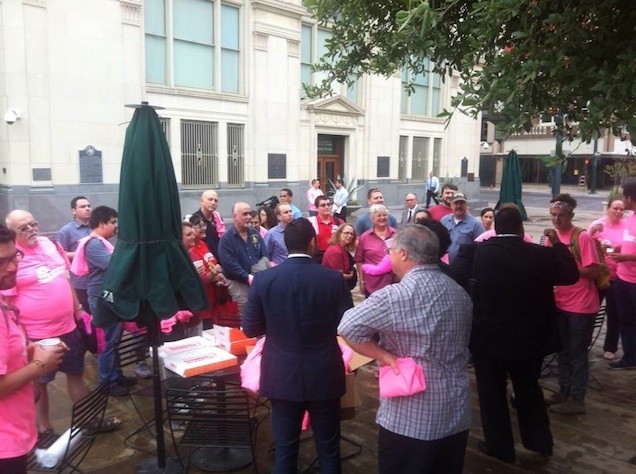Photo by Albert Salazar
Dozens of Lyft and Uber supporters gathered at a City Council Public Safety Committee meeting today to express support for rideshare mobile apps. The show of strength was outmatched by the over 100 Yellow Cab drivers and employees who came to protest the transportation startups’ foray into the San Antonio market.
The committee gathered to hear public comment on the rideshare debate as well as a brief from San Antonio Police Chief William McManus. In late March, he issued a cease and desist to Lyft, less than a week after the company began San Antonio operations. Mayor Julián Castro responded with a call for the City to find a way to work with the startups that currently don’t adhere to existing taxi ordinances.
Both Lyft and Uber maintain that they are technology platforms, not transportation companies, and, as such, are exempt from the City’s stringent transportation regulations. The companies do take steps to ensure passenger safety, including comprehensive vehicle inspections and background checks for drivers. The two app providers have expressed a desire to work with city government to design a regulatory framework that allows both companies to operate in full legal compliance.
While the City works to reach some sort of regulatory reconciliation, McManus maintains that he will continue to enforce San Antonio’s current transportation code by issuing citations to Uber and Lyft drivers. To date, the San Antonio Police Department has issued ten citations to rideshare drivers, according to McManus, though he declined to elaborate just how police went about identifying unregulated vehicles for hire. Citations for operating a vehicle for hire without a permit can lead to up to $500 in fines. McManus pledged during today’s meeting that drivers who are issued citations will also have their car impounded from this point forward.
Lyft and Uber drivers and passengers pressed the committee to find a way to work with the companies, citing the need for more transportation alternatives, greater consumer choice and the positive experiences they had with the services. Some fans of the service remarked how they found rideshare more reliable, like they were catching a ride from a friend. A recent piece from Wired explains that rideshares and other companies that are spearheading the sharing economy are helping participants overcome their distrust of one another.
But according to the employees and drivers at Yellow Cab, who dominated the public comment portion of today’s meeting, rideshares pose a grave risk to local citizens. The members of the Public Safety Committee, chaired by District 7 Councilman Cris Medina, appeared to agree. Committee members affirmed Chief McManus insistence that Lyft and Uber cease operations until a reconciliation between the City, local taxi and limo companies and the rideshare providers is met.
A group comprising all three entities will be formed to explore possible changes to the City’s transportation ordinances. Recommendations will be brought to City Council in August. Whether changes to the City code will be made to accommodate Lyft and Uber remains to be seen. Both McManus and District 5 Councilwoman Shirley Gonzalez expressed their doubts, noting that the City's current transportation regulations were a 10-year undertaking.
“I don’t know if we can, but we’re going to try,” McManus told the committee.
For the time being, both Uber and Lyft will continue to operate under their rogue status.


